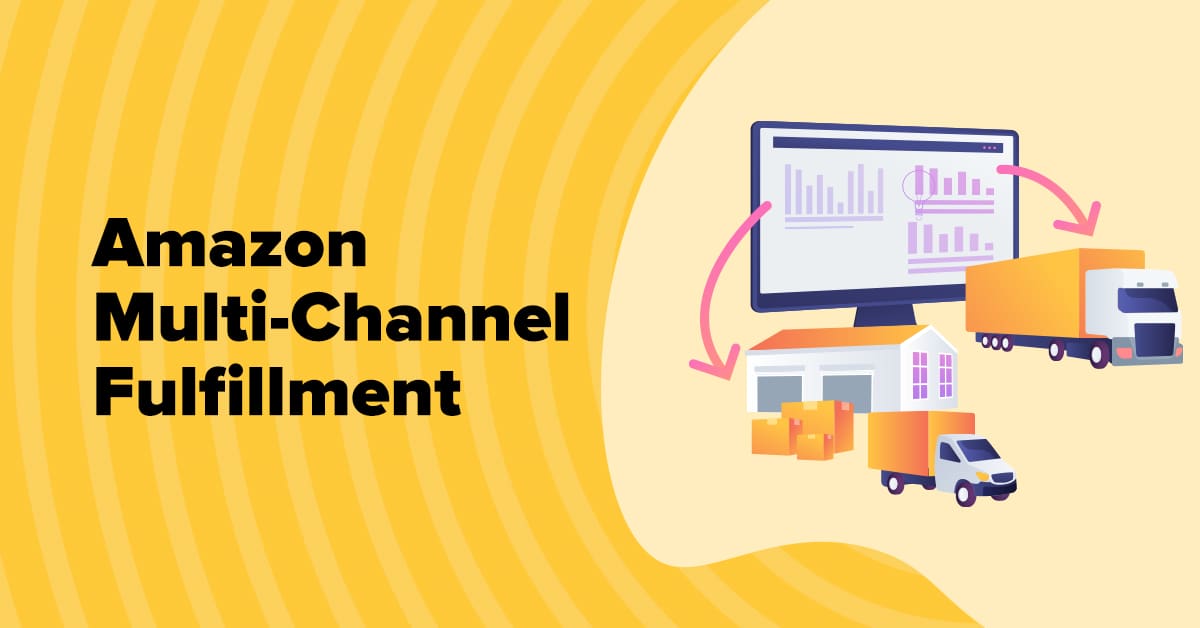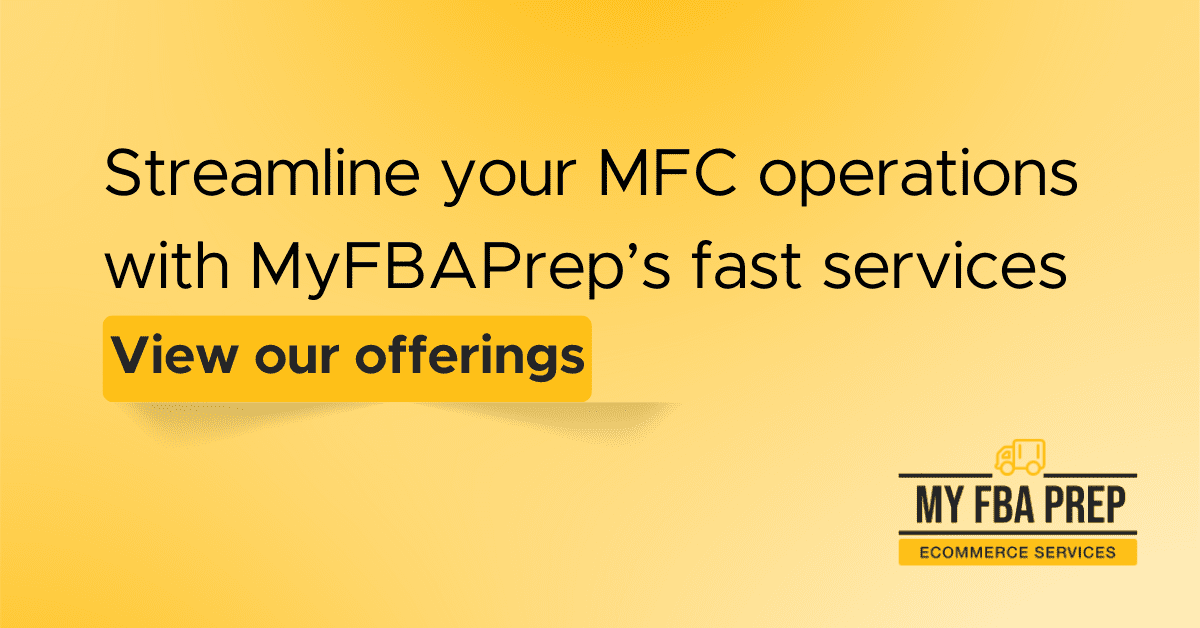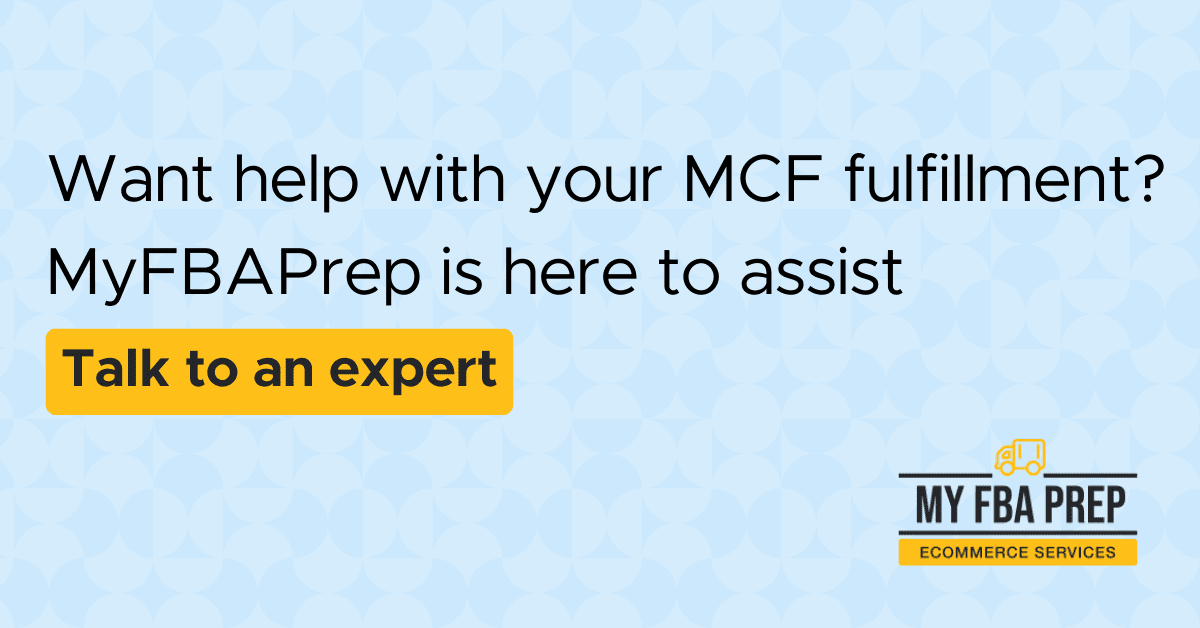
Amazon Multi-Channel Fulfillment: Benefits & Drawbacks of MCF

If you’re an eCommerce business owner, you’ve probably heard rumblings about Amazon Multi-Channel Fulfillment (MCF) and how it can help you grow your business. But you might be wondering, What exactly is Amazon MCF, and how can it benefit my business? In this blog post, we’ll answer those questions and more.
Don’t have time to dig in? Here’s the short version:
TL;DR –> MCF
MCF is a fulfillment service that lets businesses fulfill orders from multiple sales channels, including Amazon, their own website, and other third-party platforms. The service has been in beta testing for almost a year and opened on January 31, 2023 to all eligible U.S. merchants.
So, how does MCF work?
Essentially, MCF uses pooled inventory stored in Amazon warehouses to fulfill orders via channels outside of the Amazon platform. So, if you’re a business owner who sells products on multiple platforms, MCF lets you streamline your fulfillment process, saving time and money.
One of the biggest advantages of this service is that it allows you to leverage Amazon’s extensive fulfillment network to fulfill orders quickly and efficiently. This is particularly beneficial for businesses that experience high levels of demand.
For brands already selling on the marketplace, MCF can simplify their fulfillment operations: Businesses can manage all their fulfillment needs from a single platform, improving the efficiency of their operations.
It also lowers the cost of fulfillment and shipping. Amazon leverages its massive logistics infrastructure to compete with large shipping carriers like FedEx, UPS, and USPS, which drives down shipping costs and provides a cheaper alternative to these big names.
Granted, there are some disadvantages to using MCF. For one, Amazon’s storage fees change frequently, and picking, packing, and shipping fees can be unpredictable. This can make it difficult for businesses to estimate their fulfillment costs.
Businesses must also meet certain eligibility requirements to qualify for MCF. One such criterion is maintaining minimum inventory levels in Amazon’s fulfillment centers, which can be challenging for businesses just starting out or that have limited resources.
Want the full details? Dig in below.
What is Amazon MCF?
The Amazon Multi-Channel Fulfillment service allows sellers to take advantage of the conglomerate’s fulfillment network to fulfill orders from external channels, such as their eCommerce websites or other marketplaces. MCF’s first-class fulfillment and shipping capabilities ensure customers receive their orders quickly and efficiently, regardless of where the orders are placed or sent.
The service works by integrating the seller’s non-Amazon sales channels with Amazon’s fulfillment network. When a seller receives an order from their eCommerce website or another marketplace, it’s passed to MCF, which then picks, packs, and ships the order to the customer. This eliminates the need for the merchant to manage their inventory or shipping processes, freeing them to focus on other aspects of their business.
MCF is particularly beneficial for sellers who have seasonal spikes in demand or who want to expand their sales channels without adding significant operational overhead. It also provides a consistent customer experience, as Amazon’s fulfillment network is known for its fast, reliable shipping and order handling.
To use MCF, sellers first need to set up their inventory in Amazon’s fulfillment network, either by sending their stock to an Amazon fulfillment center or by using Amazon’s FBA (Fulfillment by Amazon) service. Once there, sellers can then adopt MCF to fulfill orders from their other sales channels.
Sellers are charged a fee for the service that includes the cost of picking, packing, and shipping orders, as well as storage fees to store their stock in Amazon’s fulfillment centers. However, the savings in time and resources merchants would otherwise have spent managing their fulfillment and shipping processes offset these costs.
How do MCF and FBA differ?
The main difference between Amazon MCF and FBA is the sales channels they support: The former allows merchants to sell products on marketplaces other than Amazon (primarily their eCommerce websites) while still leveraging Amazon warehouses for fulfillment. Meanwhile, FBA only fulfills orders from the Amazon marketplace.
This is huge for eCommerce professionals looking to grow their web presence and diversify their sales channels — especially those with unique product offerings on each channel.

Benefits of Amazon MCF
Amazon MCF’s greatest advantage is that it allows businesses to leverage the marketplace’s extensive fulfillment network, which improves the speed and reliability of their order fulfillment. This can be a lifesaver for businesses that experience high demand and need to guarantee prompt and efficient delivery.
For brands that already sell on Amazon’s platform, MCF can save time and reduce the complexity of their fulfillment operations. Businesses can manage all their logistical needs from a single platform, simplifying these processes.
For small to medium-sized sellers, Amazon MCF also cuts costs on fulfillment and shipping. Amazon leverages their massive logistics infrastructure to compete with large shipping carriers like FedEx, UPS, and USPS and drive down shipping costs.

Drawbacks of Amazon MCF
While there are many benefits to using Amazon MCF, there are also some downsides to consider. For instance, Amazon’s storage fees change often, and picking, packing, and shipping fees are known to be unpredictable, meaning costs can add up quickly.
Merchants may also be required to meet minimum inventory levels in Amazon’s fulfillment centers, which can be challenging for businesses just starting out or that have limited resources. Additionally, there’s little to no access to your inventory, and Amazon may move it without notice.
Lastly, Amazon doesn’t offer customization options for packaging, which can be a major deterrent for brands wanting to make an impression on their customers.
Who should use MCF?
Amazon (MCF) is a valuable service that can benefit a wide range of sellers who want to streamline their fulfillment processes and expand their sales channels, such as:
- Ecommerce retailers: If you have your own eCommerce website, using Amazon MCF can help you scale your business and reach a wider audience without having to build your fulfillment and shipping infrastructure. By integrating your website with Amazon’s fulfillment network, you can offer your customers fast, reliable shipping and handling, which improves their overall buying experience and increases customer loyalty.
- Multi-channel retailers: If you sell products on multiple marketplaces or channels like eBay, Walmart, and Shopify, you can streamline your fulfillment processes and manage all your sales channels from one central location on Amazon MCF. This helps reduce errors and shipping costs, as well as optimizes inventory management and order tracking.
- Seasonal sellers: For those who sell seasonal products or experience fluctuations in demand, Amazon MCF can help manage inventory more efficiently and avoid the costs of maintaining an internal fulfillment and storage infrastructure. Using Amazon’s fulfillment network, you can quickly ramp up or scale down your inventory as needed, without worrying about warehouse and shipping overhead.
- International sellers: Amazon MCF is highly beneficial for merchants who sell products to customers in different countries, as it reduces shipping costs and provides a better customer experience. Amazon has a global network of fulfillment centers so you can store your inventory closer to your customers and cut shipping times and costs. As a result, you’ll compete better with local sellers and improve your international sales.
- High-volume sellers: If you sell a large amount of products, Amazon MCF enables you to automate and streamline your fulfillment processes, which reduces errors, saves time, and improves customer satisfaction. Outsourcing your fulfillment to Amazon frees you to focus on other aspects of your business, such as marketing, product development, and customer service, while leaving the logistics to the experts.
- New sellers: News sellers just starting out can leverage Amazon MCF to gain momentum quickly with no significant up-front investment in fulfillment and shipping infrastructure necessary. By capitalizing on Amazon’s world-class fulfillment network, you can build your brand and gain a foothold in your market faster than it would normally take.
Whether you’re a small eCommerce retailer or a large multi-channel seller, Amazon MCF can reduce your overhead, improve customer satisfaction, and scale your business more efficiently. If you’re interested in learning more about Amazon MCF, visit the Amazon Services website.
Wrapping up — Hone your logistics with Amazon MCF
Amazon Multi-Channel Fulfillment is a great option to improve the efficiency and reliability of your fulfillment operations. However, first consider the potential costs and requirements associated with this service to determine how profitable it could be for your business. If you’re a U.S.-based merchant wanting to expand your sales channels and streamline your order fulfillment process, Amazon MCF might be the solution to take you to new heights.


